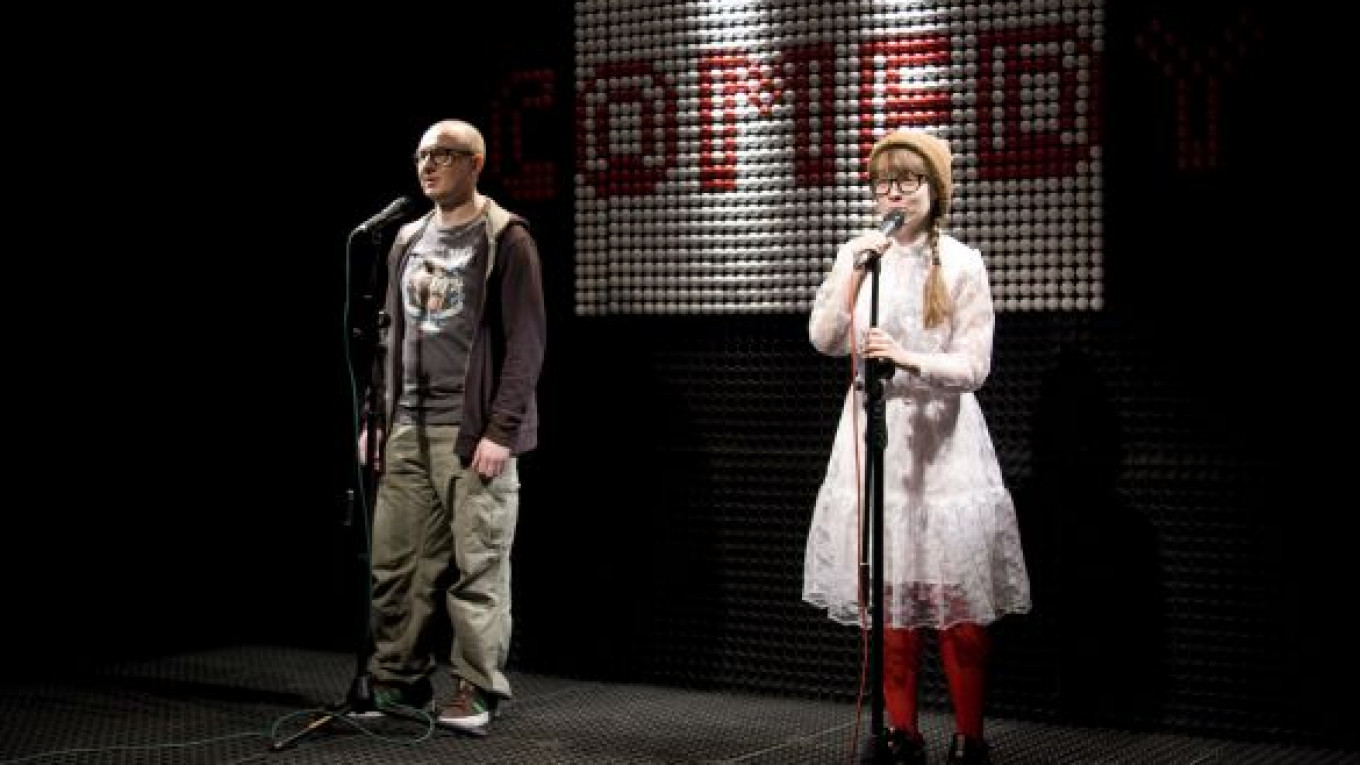Good writers can be seen in even the shortest phrase they write. Each has a DNA code that reveals his or her vision, point of view and personality in all that they do.
This is eminently true of Ivan Vyrypayev, whose new play, “Comedy,” opened at Praktika Theater last weekend.
Vyrypayev is a personal kind of writer. On the surface he plays with generic images and myths. But deep inside his dialogues and monologues there is an invitation to share something that is sacred to him — a belief in, or at least a hope for, a moral construct in the world.
In his most famous play, “Oxygen,” he squeezes a pair of hip young people into a Biblical context as they search for meaning in a confusing world. In “July,” a one-actor text, he plays with the omnipresent modern template of murder, murderers and a few stabs at redemption.
Vyrypayev never gets up on soapboxes to make speeches. And his perception of morality may not fit anyone else’s. That in itself is a first step toward an individual style. The paradoxes of Vyrypayev’s work are unique to him alone.
Not surprisingly, “Comedy,” which Vyrypayev also directed, is frivolous on the surface and has pretensions of profundity underneath. Each spectator will find his or her own attitude to this piece of stand-up theater, if I may call it that.
I found more frivolity than depth in it, although I will be the first to admit that humor, like beauty, happens only in the eye and mind of the beholder. Vyrypayev here attempts to subvert the vapid genre of Russian TV stand-up comedy, but that hardly seems a task worthy of his talent.
Designer Margarita Ablayeva’s set echoes the visuals of a television soundstage. Red letters spell out “comedy” against a black and white background. Two microphones stand on stage, and two actors — Valery Karavayev and Inna Sukhoretskaya — step up to them and deliver comic monologues that may or may not be funny.
Transitions between groups of monologues were staged by choreographer Oleg Glushkov, who created purposefully goofy and sentimental dances to music such as “Jingle Bell Rock” and The Beatles’ “Strawberry Fields Forever.”
Purposefully goofy — a phrase one cannot avoid in discussions of contemporary Russian culture. It was codified as a style when playwright/actor Yevgeny Grishkovets became popular in the late 1990s with his self-effacing monologues.
Vyrypayev at times clearly draws water from the same fountain. Arguably, however, his best work is that which takes up position a comfortable distance away from what Grishkovets called “the new sentimentalism.” In plays such as “Genesis-2” and “July,” and in the compelling film he himself made of “Oxygen,” it was Vyrypayev’s ability to take on big problems and dangerous topics in unusual formal structures that allowed him to establish his voice as one that was unique and challenging.
The running jokes in “Comedy” — several of which are called “unfunny tales” — circle around topics that could be thought-provoking. Religion, politicians, race and nationality, and alternative sexuality are some of the territories mined.
Rarely, however, did I see these monologues do more than scratch surfaces.
Hitler winds up in Jewish heaven. Moses winds up in Nazi heaven. The Pope winds up in Muslim heaven. Two gays keep seducing women for fun. A lonely woman waits for her spiritual adviser to die and be reincarnated in order to marry him, and she follows through with it when he comes back as a female. Two black widows riding the metro in Chechnya learn that they became terrorists because one was the wife of a martyr, while the other was his lover. Aliens will save 15 Russians if they’ll explain why it’s a good idea to cancel and forget Victory Day celebrations, but they give up on their plan when the only person who comes forward is an SS officer.
Now, I know it is unfair to summarize jokes like this. On the other hand, “Comedy” did not encourage me to look beyond the surface of its tales.
The two actors delivered their lines with the requisite contemporary stance — indifferent irony — which did create a sense of human contact. And I heard Vyrypayev’s intonation in every word spoken. The glib hipness of “Comedy” could only have come from his pen.
Is “Comedy” better than anything you’ll get on television? Unquestionably. Is it vintage Vyrypayev? Not even close.
“Comedy” (Komedia) plays Nov. 6 and 7 at 9 p.m., and Nov. 20 and 21 at 8 p.m. at Praktika Theater, located at 30 Bolshoi Kozikhinsky Pereulok. Metro Tverskaya, Mayakovskaya. Tel. 258-5565, www.praktikatheatre.ru. Running time: 1 hour, 5 minutes.
A Message from The Moscow Times:
Dear readers,
We are facing unprecedented challenges. Russia's Prosecutor General's Office has designated The Moscow Times as an "undesirable" organization, criminalizing our work and putting our staff at risk of prosecution. This follows our earlier unjust labeling as a "foreign agent."
These actions are direct attempts to silence independent journalism in Russia. The authorities claim our work "discredits the decisions of the Russian leadership." We see things differently: we strive to provide accurate, unbiased reporting on Russia.
We, the journalists of The Moscow Times, refuse to be silenced. But to continue our work, we need your help.
Your support, no matter how small, makes a world of difference. If you can, please support us monthly starting from just $2. It's quick to set up, and every contribution makes a significant impact.
By supporting The Moscow Times, you're defending open, independent journalism in the face of repression. Thank you for standing with us.
Remind me later.







